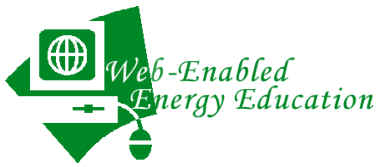 John J.
"Jack" Mc Gowan, CEM
John J.
"Jack" Mc Gowan, CEMContributing Editor
AutomatedBuildings.com
|
[an error occurred while processing this directive] |
 John J.
"Jack" Mc Gowan, CEM
John J.
"Jack" Mc Gowan, CEM
Contributing Editor
......electronic energy-education is not only a requirement to continue to exist, but is a tremendous opportunity for companies to deliver more value to their customers. The concept of real-time and dynamic services are recurring themes in the Automator's articles, and when these concepts are applied to energy education it may become evident that this is one of the greatest tools in recent times to maximize the performance of automation technology.
This month's issue of the Automator focuses on e-education, which is generally defined as electronic education, but for the purposes of this article could be e2- education or electronic energy education. The question is, will World Wide Web or "Web" change the way that education is delivered? First it is important to define education; particularly professional development of the type that would be called "Energy Education, as a business venture. In Web vernacular this would be a Business to Business (B2B) service, and contrary to public perception this market niche, or "space" is not in decline. In fact the latest industry estimate from a Gartner e-business group report published in Information Week.com, March 14, 2001 projects that the B2B industry will experience continued dramatic growth and reach $8.5 Trillion by 2005. Of course Web-enabled Education, and as a subset of that Energy Education, is only one small market focus within this market, but the potential is very promising.

[an error occurred while processing this directive]Online Education is an explosive growth area. Newsweek Magazine published a report last year (April 24, 2000 issue), which projected that 5.8 million people would be actively pursuing higher education through online Universities by the end of 2000, and that 75% of the four year Universities in the United States had launched online campuses. The drivers for this are numerous and include convenience, lack of access to a nearby college campus and flexibility of the asynchronous venue. Asynchronous means that all class members need not participate at the same time as they would in a traditional "synchronous" class environment. The asynchronous venue is possible online because students can sign on at anytime, send emails, post assignments and download course materials. Now consider the benefits of this approach for professional development in the energy and automation environment. It is no longer necessary to get on an airplane and travel to get specialized training and this can be done with a minimum loss of productive time. Interactive compact disk (CD) based training programs have become extremely popular, but the issue there is that it is difficult to ask questions and discuss current trends. In an online environment, a student can post a question or challenge a concept and typically have a response within 24 hours.
Education through Information Access
Beyond actual classroom style instruction, there are a number of other Web-enabled services that could fit in this category of informal e-education, particularly Information Access. Several of these services may seem to be off track from formal education, but the intent of this article is to highlight not only traditional classroom education, but also what might be call "on the Web training." The Web or Internet offers a host of professional development opportunities that are extremely valuable. Internet based tools for Information Access are impacting all industries, even high school students are well aware that a wealth of information is available through the Web. There are numerous search engines, and it is possible to find phenomenal amounts of data, even on relatively obscure topics. Information access may be the first area in which the Web has fulfilled the dramatic predictions for its value as a tool. Of equal importance the access to this information provides a wealth of ongoing learning opportunities for everyone who is interested. Even something as simple as search for the meaning of a new technical term on http://www.techweb.com and click on Tech encyclopedia, which offers useful definitions to help professionals stay current. The amount of time required to develop a very detailed overview on nearly any topic has been dramatically reduced.
Every company, organization and government agency it seems now has a Web site, and it is possible to download anything from the annual report of a public company to a National Oceanographic and Atmospheric Association report on last year's weather in Albuquerque. Many of these sites are also beginning to serve as Portals for training and information from the organization. Utility Internet sites offer managers easy access to information, such as rate structures and account history. HVAC and Control manufacturer Web sites offer submittal data that may be downloaded. Set aside the e-commerce topic, which is covered later, these sites can be a valuable resource to help customers get service or to simply download a piece of literature. Among the exciting government sites, is the California Energy Commission "Energy Water Connection." This site serves as a clearing-house for information on the synergy between energy and water management, which was also the topic of a technical session at the World Energy Engineering Congress in October 2000.
Human resources is another area of note for easy information access. Need a resume for an energy engineer? Yes, even job hunting is being changed by the Internet. Want ads and resume banks are available through electronic magazines (e-zines) and employment sites. These employment sites allow professionals to get on line to both review available jobs and post resumes. Since many of these sites are linked, a resume that is posted once could be seen by numerous potential employers. E-zines are another excellent source of professional developments, consider AutomatedBuildings.com as a prime example.
Professional Development
More along the lines of formal education or "professional development" training, Engineering and Trade Associations are active on the Internet, and their sites offer a host of learning opportunities. Al Thumann, Executive Director of the Association of Energy Engineers (AEE) notes that there is a wealth of information available through AEEcenter.org. The AEE Web site offers monthly updates on speakers and conference papers to be offered throughout the year, so that the site can be hit to quickly scan upcoming technical content and choose the best venue to attend. The association also offers a Virtual Trade Show with 24 hour, 7 day (24/7) access to the latest information on new products and service. Thumann points out that AEE has implemented a forward-looking feature for members by sponsoring Web Chat Sessions on timely technical topics. In these Chat Sessions professionals from around the world can log on and participate in discussions on the latest developments regarding a variety of energy engineering topics.
AEE also offers a wide variety of services to members worldwide that include online bookstore and perhaps a first in the industry, online seminars. The growth in Online Higher Education is dramatic, as Newsweek reported and based upon a recent study by InterEd. Online energy education through AEE and other sources is therefore a very timely service.
The Association of Energy Services Professional (AESP) has similar efforts underway. AESP notes that five years ago so few of their members were online that the Association considered supplying modems to those who would use electronic communication. Things have changed because today more that 95% of their members are online. Based upon growing use of the Web, AESP has incorporated a list of "Energy Hot Links" on their site identifying excellent resources for information searches. In May of 2000 AESP sponsored a conference titled "Using the Internet in the Energy Business". The conference responded to the significant interest energy services professionals have shown in this topic. Conference sessions included Wholesale Energy Markets and the Internet and Internet-based Billing. The offering of such products and services truly makes the transition from discussing Information Access to e-commerce.
The Web offers the full spectrum of learning opportunities from online university instruction to virtual trade shows and online seminars. The ultimate benefit to professionals is that more specialized training is available on a broad scale than ever before. There is merit in mentioning the latest business unit from Yahoo! ™, Corporate Yahoo™. This is a group that allows companies to securely aggregate corporate content and services by creates custom portals for a variety of customer needs and is patterned after the MyYahoo™. The first example of this in the controls industry is MyHoneywell.com™, and the significance here is that among a variety of other information is available through the portal including training. Trade Associations and corporations as well will continue to leverage the power of the Web and offer countless opportunities for e-education to energy professionals. With the tremendous potential to offer specialized training in a rapidly changing marketplace, companies who ignore this venue may not only miss an opportunity by lose market share. In a recent 60 Minutes episode, John Chambers, CEO of Cisco Systems went so far at to say that traditional universities that do not adopt online higher education programs may not exist in 20 years. The author's belief is that electronic energy-education is not only a requirement to continue to exist, but is a tremendous opportunity for companies to deliver more value to their customers. The concept of real-time and dynamic services are recurring themes in the Automator's articles, and when these concepts are applied to energy education it may become evident that this is one of the greatest tools in recent times to maximize the performance of automation technology.
[an error occurred while processing this directive]
[Click Banner To Learn More]
[Home Page] [The Automator] [About] [Subscribe ] [Contact Us]